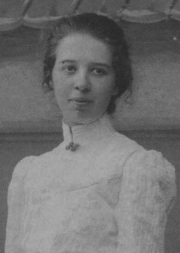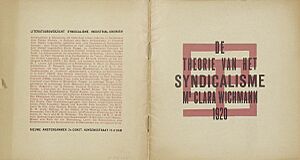Clara Wichmann facts for kids
Quick facts for kids
Clara Wichmann
|
|
|---|---|
 |
|
| Born |
Clara Gertrud Wichmann
17 August 1885 Hamburg, German Empire
|
| Died | 15 February 1922 (aged 36) The Hague, Netherlands
|
| Nationality | German–Dutch |
| Other names | Clara Meijer-Wichmann |
| Occupation | Lawyer, writer |
| Movement | Feminism, Anarchism |
| Spouse(s) |
Jonas Meijer
(m. 1921–1922) |
| Children | Hetty Clara Passchier-Meijer (daughter) |
| Parents |
|
| Relatives | Erich Wichmann (brother) |
Clara Gertrud Wichmann (born August 17, 1885 – died February 15, 1922) was a German-Dutch lawyer and activist. She was a strong supporter of feminism, which means equal rights for women. She also believed in anarchism, a way of thinking that suggests people can live together without strict government rules. Clara became a leading voice for changing how the justice system worked, especially pushing for a world without prisons.
Contents
Who Was Clara Wichmann?
Clara Wichmann was born in Hamburg in 1885. Her father was Carl Ernst Arthur Wichmann. In 1902, she began studying philosophy, which is about big ideas and how we think.
Clara's Ideas About Justice
From 1903 to 1905, Clara studied law. During this time, she started to question the way the justice system worked. She felt it was too focused on punishment.
Clara developed her own ideas about criminal law. She believed that prisons should be done away with. She also thought that the justice system should not just be about punishing people. She wrote a big paper about these ideas, which helped her earn a special law degree in 1912.
In 1914, Clara started working for the Dutch Statistics Office as a lawyer. This office collects important information about the country. She was later promoted to a higher position. She helped gather facts about crime and became the head of the Judicial Statistics Department in 1919.
Fighting for Women's Rights
Clara also joined the Dutch feminist movement in 1908. This movement worked for equal rights for women. She helped start the Dutch Society for Women's Suffrage. This group fought for women to have the right to vote. She was also on the board of another group that worked to improve women's social and legal standing.
From 1914 to 1918, Clara helped write a large book called Women, the women's movement and the women's issue. This book looked at the history of feminism.
Against War and for Freedom
Clara was against World War I. In 1918, she became an anarchist. Anarchists believe in societies where people cooperate freely without a strict government.
She became very active in the movement to get rid of prisons. She spoke out against punishment, calling it "a blot of backwardness." In 1919, she created a group called the Committee of Action against the existing views on Crime and Punishment. She also helped start the Union of Revolutionary Socialist Intellectuals.
On March 21, 1920, Clara gave a public speech. She said that crime often comes from unfairness in society. She believed that if everyone was treated fairly, most crimes would disappear. That same year, she helped found the Union of Religious Anarcho-Communists. She wrote many articles for their newspaper, The Free Communist. In these articles, she encouraged people to go on strike actions. She saw strikes as a peaceful way to protest against social injustice.
In 1921, Clara married Jonas Meijer. He was a pacifist, meaning he was against war and violence. Clara died in 1922, shortly after giving birth to her daughter, Hetty Clara.
Clara's Lasting Impact
After Clara's death, her husband, Jonas Meijer, continued to publish her writings. Their daughter, Hetty Clara, grew up to be a doctor. She also worked to keep her mother's ideas alive by publishing and archiving her work.
In 1987, the Clara Wichmann Institute was opened. This institute works to support women's rights. In 2005, the institute looked into issues like positive discrimination. This is about making sure women are treated fairly, especially when it comes to religious reasons. They also studied how this relates to international agreements on gender equality. That same year, a book about Clara Wichmann's life, called Passion for Freedom, was published.
Images for kids
 | Frances Mary Albrier |
 | Whitney Young |
 | Muhammad Ali |



